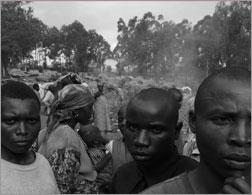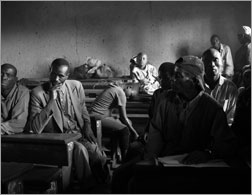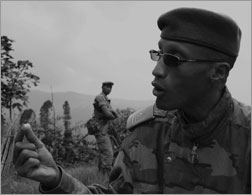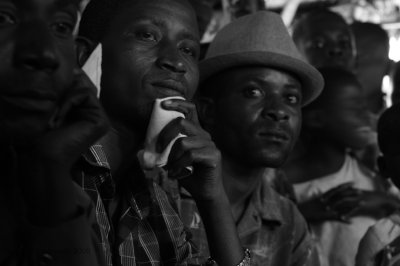In the North Kivu province of eastern Congo, people are living in ditches along the sides of roads. They're filling up the floors of churches and schools. Displaced people are surrounding the compounds of bewildered U.N. peacekeepers. Young boys and men are hiding in the forest to avoid being killed or forced into armed groups.

"There are only girls left in the schools in my village," one 13-year-old boy told me. The day before, he and three friends had run from rebel soldiers who'd come to kidnap them.
There are now more than 1 million displaced people scattered throughout the province. In the last 10 years of fighting, more than 5 million people have died in the Congolese conflict—mostly civilians who haven't had access to enough food or health care because of the fighting. And let's be clear: That's 5 million and counting.
In many of the displaced communities, only the generosity of neighbors keeps people from starving. The insecurity in the region makes it dangerous for aid groups to provide humanitarian support. Consequently, tens of thousands of average citizens have let strangers stay in their homes or yards and work their fields in exchange for a little food.
But now, many of those host families are displaced, too. One in five Kivutians has left home because of the fighting. People are terrified and starving, and it is an utter disaster that is all the more tragic because it was utterly avoidable.
Earlier this year in Goma, U.N. official Phil Lancaster told me, "As much as the international community can feel responsible for Rwanda, it should feel even more responsible for what happened here in Congo." Lancaster knows what he's talking about. As a U.N. soldier, he watched the 1994 genocide happen in Rwanda. And until September, he led the U.N. program that encouraged Rwandan Hutu rebels who'd been living in Congo since the genocide to go home.

Here's how the chain of cause and effect unfolded: In 1994, after the Rwandan genocide, the Hutu militias responsible for perpetrating the deaths of hundreds of thousands fled across the border to Congo, along with more than a million Rwandan Hutu civilians who feared for their lives. Since then, some of the perpetrators have remained in the Kivus, the part of Congo that borders Rwanda, with disastrously destabilizing consequences. In 1996 and again in 1998, the Tutsi-led Rwandan Patriotic Army invaded the Kivus, ostensibly to track down the remaining génocidaires; they killed hundreds of thousands of others in the process, and at least eight other countries became involved in the fighting. The war continues in the Kivus today, another chapter in a bloody saga that could have ended long ago.
The current installment involves a Congolese Tutsi, Laurent Nkunda, a former general in Congo's army who now styles himself a protector of his tribe from the remaining génocidaires and a liberator of the oppressed all across Congo—whether they want to be liberated by him or not. He's supported by a cadre of Tutsi but also by some Hutu and others who run the economy of the Kivus. He is also not-so-secretly supported by the Tutsi-led government of Rwanda.
Nkunda has launched a war of libération totale (his words) to save the Congolese people from a government that provides neither development nor security (the former being true because in the land of Mobutu Sese Seko, corruption is still rampant, and the latter being true mostly because of Nkunda himself). Technically, Congo is a democracy, so this total liberation should have waited until the next elections. But since Congolese Tutsis are such an insignificant part of the general population, Nkunda—a lifelong soldier—decided to use means other than the ballot.
And the early returns look like displacement, starvation, rape, murder, and terror.

The Congolese army has lost almost all control and command in North Kivu. Instead of pushing back the rebel advance, they've turned into a monstrous version of Dylan Thomas' childhood set of tin soldiers, "Who, if they could not fight, could always run." And rape. And loot. And kill the very people they're supposed to protect from Nkunda. It is an unfortunate truism in eastern Congo that the army is just as bad as the rebels, only there are five times as many of them.
Power-hungry Nkunda, his shameless Rwandan supporters, and the feckless Congolese government are primarily to blame. But the Rwandan and Congolese governments remain in power only because of the foreign powers that support them with enormous amounts of aid and diplomatic support. The failure of the United Nations and the international community—by which I mean the European Union, the United States, and the African Union—is massive.
Only 10 months ago, peace seemed within reach. Rwanda and Congo had signed an agreement to disarm, finally, the Rwandan Hutu militia. In January, Nkunda's rebels and the government (along with more than 20 other armed groups) signed a cease-fire overseen by the European Union, African Union, and United States and committed to a peace process.
But even before the January conference was over, Nkunda started rearming and recruiting. At the same time, Congolese government planes began roaring into Goma full of troops, until 25,000 undisciplined, underpaid soldiers were staggering drunkenly around the province.
The government insisted the soldiers were there to fight the Rwandan Hutu rebels (the FDLR), but everyone knew they were there to fight Nkunda. It was no secret that the army was only willing and able to disarm the FDLR, their erstwhile allies against Nkunda, with support from the United Nations and the international community and with cooperation from the Rwandans themselves.
But exactly when it was needed most—exactly when they had the chance to put the legacy of the Rwandan genocide to rest—the support and cooperation and pressure from the international community never materialized.
Europe and the United States did not force Rwanda to cooperate with diplomatic efforts to disarm the FDLR, and they never sent more than superficial support for the U.N. peacekeepers in their military effort against the FDLR. As the summer progressed, diplomatic presence in the region waned.
Anneke Van Woudenberg, Human Rights Watch's Congo expert, says the diplomats became tired of the peace process. "And that is exactly what Congolese people don't need. What [the people of Congo] need is for the United States, the European Union, and the African Union to be here every single day banging the table and making sure these groups adhere to what they signed up for."
Eastern Congo is a place of vast wealth in land and minerals, and all sides have their hands in the pot—or in the mines or forests or in the slaughterhouses. Rarely does any side negotiate in good faith, which is perhaps understandable after 14 years of war. But in the past, the parties involved have proved responsive to diplomatic and military pressure—if it's credible.
Right now, it's not. Only 5,500 U.N. peacekeepers currently patrol North Kivu, a mountainous region with more than 5 million inhabitants and at least 40,000 heavily armed soldiers and militia. Compare this with Chicago on the night of the U.S. presidential election, where 13,500 police patrolled a city of about 3 million that, as far as I can tell, hasn't had a militia since the 1860s.
Although it is the biggest U.N. mission in the world, the MONUC mission in Congo has never received the full troop allotment it has asked for, and the civilian section is chronically and disastrously understaffed.
Ironically, the current head of the U.N. mission in Congo, Alan Doss, was hired to wind down the $1 billion-a-year operation. Instead, he's asking for reinforcements. To put it kindly, Doss' first 11 months in Congo have been inauspicious. He has stood by as massacres have taken place in Bas Congo and Ituri provinces and now he has permitted a rebel movement backed by a foreign country to essentially take over North Kivu.
Doss' staff is near mutiny. His force commander resigned after one month for "personal reasons," which U.N. insiders tell me was code for We're heading for disaster, and I don't want to be at the helm. People who know much more about Congo than Doss say he has absolutely no vision for the east.
It took until Sept. 19 for Doss to request more peacekeepers for North Kivu, even though there had been cease-fire violations for months and three weeks of outright war. Now, nearly two months later, it looks as if the United Nations may be thinking about possibly considering sending reinforcements to North Kivu. Perhaps. If the United Nations says yes, the deployment will take two or three months, which raises the question of what 1 million displaced people will eat in the meantime, since the current insecurity prevents them from harvesting their fields.
The most obvious solution would be to send an EU rapid-reaction force to fill the security vacuum, but EU diplomats are dithering because—well, there's no other way to say it: DRC is not a genuine priority. Instead, Angola is sending troops to fight alongside the Congolese army. Rwanda is essentially already fighting alongside Nkunda. And if, in a few weeks, Uganda and Zimbabwe join in as well, we can all party like it's 1998-2003.
Over the years, many world leaders have made the trip to Rwanda to stand before the gravesites of genocide victims and apologize for their inaction in 1994. But if the worth of an apology is measured not in words but in actions, most of these apologies have been rubbish. True repentance for Rwanda has always meant ending the Congolese conflict—especially in the Kivus.
So maybe we should dust off one of the best apologies for Rwanda ever rendered and repurpose it for Congo, so that world leaders can get the talking out of the way and start acting. Here's President Bill Clinton in Kigali, circa 1998:
It may seem strange to you here, especially the many of you who lost members of your family, but all over the world there were people sitting in offices, day after day after day, who did not fully appreciate the depth and speed with which you were being engulfed by this unimaginable terror.
There are hundreds of thousands of people in North Kivu right now who are starving, hiding in the forest, and living in ditches in unimaginable terror that they might be killed.



